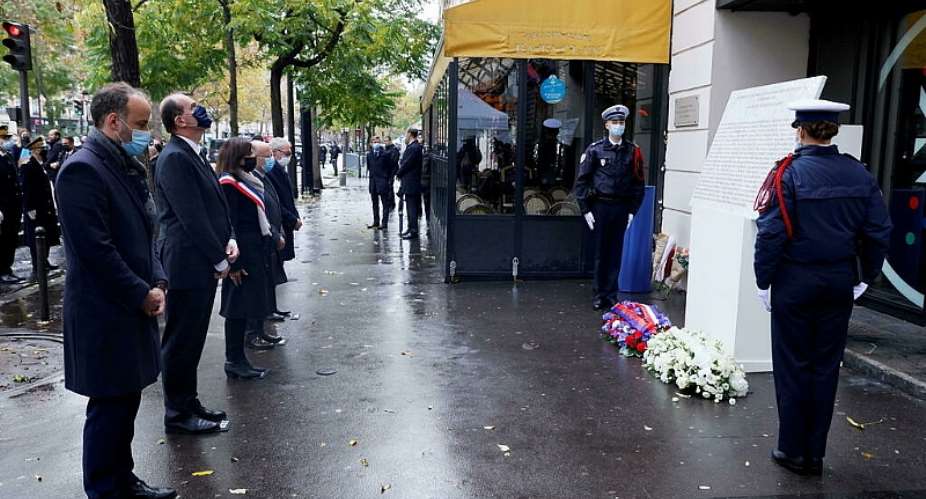The special criminal court, where 20 men are being tried for their alleged involvement in the November 2015 terrorist attacks in Paris, heard two expert witnesses on Tuesday. Hugo Micheron is a researcher who has worked on radical Islam in Syria, in French prisons and in the Brussels suburb of Molenbeek; Bernard Bajolet was head of the French external intelligence service at the time of the attacks.
Hugo Micheron is an impressive young man. He teaches at Princeton in the United States, and at the Paris Institute of Political Science. His subject is radical Islam. He dislikes oversimplification.
If, for example, you think that a large immigrant population of north African origin, high unemployment and its related social problems are sufficient to explain why there were so many French volunteers in the ranks of Islamic State in Syria, Hugo Micheron will ask you to explain the poor northern suburbs of the French Mediterranean city of Marseille.
There, all the textbook conditions are tragically in place. But there were practically no departures.
Then he will want you to explain why 65 IS fighters were recruited in the relatively tiny Paris satellite town of Trappes.
And then you'll have to explain how "we went from a couple of dozen foreign jihadists who fought in Bosnia to the 6,000 who left for Syria, twenty years later".
There are no easy answers. And part of the problem is that we may be looking in the wrong place. Or, at least, at the wrong time.
"There's much more to jihadism than spectacular attacks," Micheron told the court. "We make the same mistakes every time because we miss what happens between the attacks. When you focus on radical Islam in the wake of an atrocity, it's like coming in at the end of the film."
Jihadist narrative
So, what are the essential elements missing from the popular narrative?
First of all, we have to recognise the power of deeply-held religious belief as a motivation. Especially for the 50 percent of IS volunteers with criminal records. The Syrian battlefields offered salvation, a form of social respectability and the prospect of eternal bliss.
There is also the factor of emulation. If one brother went to Syria and sent back glowing accounts of life in the caliphate to his family and friends, other brothers and close acquaintances frequently followed.
Some volunteers were motivated by a genuine humanitarian concern for the victims of the Syrian war. Others by the availability of Yazidi sex slaves. Some were simply in search of a outlet for illegal rage and violence.
Radical preachers played a key role in the recruitment chain. But again, the picture is more complicated than we might wish.
Micheron interviewed dozens of prisoners serving sentences for terrorist crimes. He said they all spoke of a wide geographical awareness of what preachers were offering.
They chose their mosque because of the radical message which was on offer there, not the other way around.
Prisons have obviously played a crucial role in the jihadist enterprise. French policy has wavered between concentrating all radical prisoners in a small number of institutions, thus ensuring a reinforcement of individual determination.
Or they can be dispersed to penitentiaries all over the country, thus guaranteeing a wider spread of dangerous doctrine. There is no easy answer.
Western failures to live up to the high promise of democracy have also boosted IS recruitment figures. The decades-long mistreatment of the men held without trial in Guantanamo is a flagrant example.
And Micheron was dismissive of the so-called "de-radicalisation centres" as "a politically motivated error. Sincere believers can not be de-radicalised. But that's not to say nothing can be done. It's a long-term process."
Hysterical debate
Hugo Micheron thinks that the current debate on Islam in France verges on the hysterical, and is stupidly reductive.
The ambition behind jihad has not gone away simply because Islamic State was defeated on the ground. We are living through one of the crucial "quiet" periods between attacks.
And we have to revise our simplistic vision of the "enemy".
"There is a real political diversity within what we think of as the monolith of radical Islam."
The trial continues.





 Mahama commends South Korea for forgiving Ghana’s debt
Mahama commends South Korea for forgiving Ghana’s debt
 Murder of Otumfuo’s Akyempimhene, 8 other cases halted over Jurors’ strike
Murder of Otumfuo’s Akyempimhene, 8 other cases halted over Jurors’ strike
 Nii Lante Vanderpuye recounts chaos in Kenya during visit
Nii Lante Vanderpuye recounts chaos in Kenya during visit
 NDC communications officer hangs dead in Awutu Senya West
NDC communications officer hangs dead in Awutu Senya West
 I was fit when Godfred Dame asked me to secure fake excuse duty – Jakpa tells co...
I was fit when Godfred Dame asked me to secure fake excuse duty – Jakpa tells co...
 Walewale: NPP youth keep vigil at police station to protect ballot boxes contain...
Walewale: NPP youth keep vigil at police station to protect ballot boxes contain...
 Association of Professional Development Communicators-Ghana to be launched July ...
Association of Professional Development Communicators-Ghana to be launched July ...
 Bawumia running mate: It’s not about tribe; the Ashantis are equally feeling the...
Bawumia running mate: It’s not about tribe; the Ashantis are equally feeling the...
 Election 2024: 'NPP will secure 50.6% victory with 142 parliamentary seats' — Al...
Election 2024: 'NPP will secure 50.6% victory with 142 parliamentary seats' — Al...
 What’s happening in Kenya can happen in Ghana; our leaders must not take us for ...
What’s happening in Kenya can happen in Ghana; our leaders must not take us for ...
